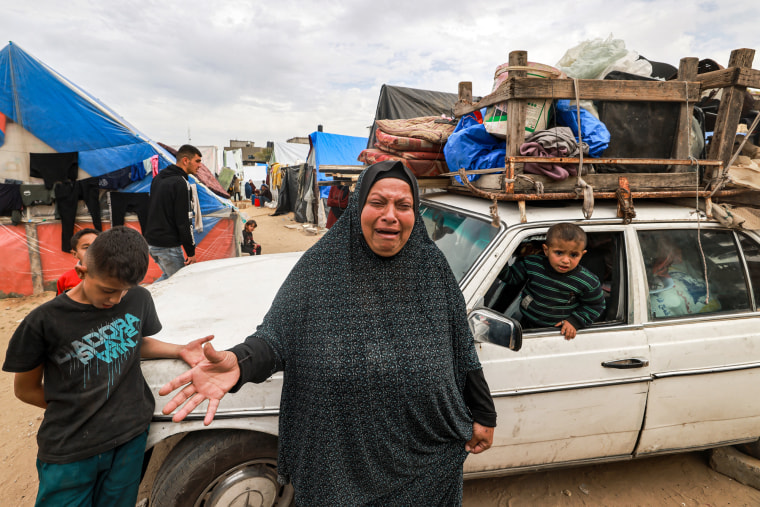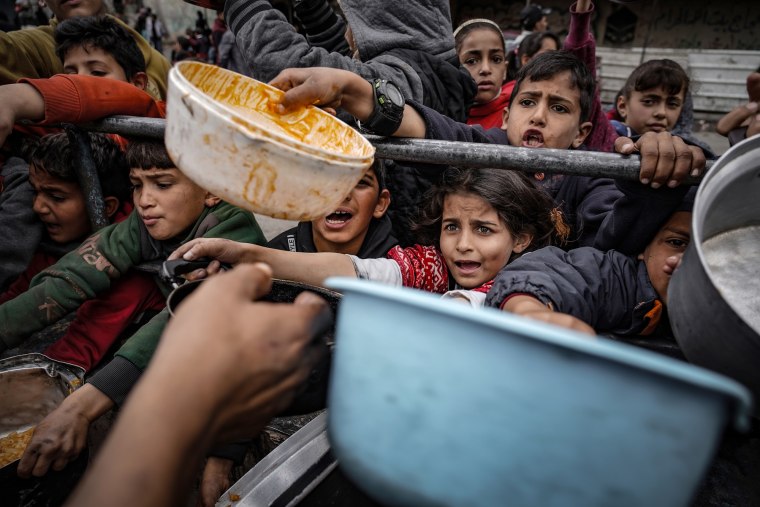In Rafah desperation grows as Israel ground assault looms
Gaza’s southernmost city is crammed with displaced, desperate and starving people, just as Israel threatens a fresh assault.
Rafah had a prewar population of around 250,000. Today the city on the Gaza-Egypt border has swelled to an estimated 1.4 million — more than half of Gaza’s population — many of them Palestinian civilians who fled the rest of the enclave as it was being bombed and partially demolished by Israeli forces.
Now, Israeli Prime Minister Benjamin Netanyahu is signaling that Rafah may be the target of his next military offensive, which he says is a necessary step toward toppling Hamas. Displaced and trapped inside a city just a few miles wide, Palestinians sheltering there are now asking a seemingly unanswerable question.
“Where do we go?” Wissam Al-Arkan, 37, who has already moved twice inside Gaza since Oct. 7, told NBC News. “We came to Rafah and now they are threatening to invade it.”
This week, thousands of people are preparing to flee again, packing tents pitched on muddy ground between Rafah’s buildings and walls. They live among tangled, rusty wire, piles of trash and other detritus of war. Some concrete buildings are charred by blasts; others are wrecked. Some children play a game, throwing this blast debris against a wall. Adults sift through the dust and rubble for anything worth salvaging.
Overhead is the ubiquitous whine of Israeli drones.
Al-Arkan is among the people who are dispossessed, packing up his belongings for the third time during this conflict, zig-zagging a slice of land just twice the size of Washington, D.C. This time he has bought a tuk tuk — a small, three-wheeled taxi — on which to load his possessions.
“We feel hopeless. What do we do?” he said.
Israel now controls swaths of Gaza’s north and midsection, according to analysis by the Institute for the Study of War, a Washington think tank. Many people who once lived in these places have been squeezed into smaller and smaller pockets in the rest of the enclave. Rafah is chief among these holdout areas — although Israel says it is drawing up invasion and evacuation plans.
Palestinians once saw Rafah as a last refuge, somewhere that had at least a morsel of the basic infrastructure and aid that has been obliterated elsewhere. But Israel made clear this week that it views the city as a last remaining stronghold for Hamas — and therefore a legitimate target.
“It is impossible to achieve the war goal of eliminating Hamas and leaving four Hamas battalions in Rafah,” Netanyahu’s office said Friday.
It would be the latest phase in a military campaign Israel launched in response to Hamas’ Oct. 7 terror attacks, in which 1,200 people were killed and some 240 kidnapped. An estimated 134 are still being held.
Israel says it goes to extraordinary lengths to warn civilians in the line of fire, putting out phone calls and dropping leaflets to let them know about imminent attacks. Some 1.7 million have already heeded — or been forced to heed — these warnings and are currently displaced in Gaza, the United Nations says. More than 28,000 people have been killed, according to Palestinian health officials.
Israel has also caught significant criticism internationally for telling Palestinians in the north to evacuate ahead of its invasion, only to start attacking the south, too, even after many of these people had fled there believing it to be safe.

One of those currently sheltering in Rafah is Mariam Mansoor Al-Loh. She has been uprooted half a dozen times in her desperate attempt to flee the violence — first while heavily pregnant, then giving birth and nursing a newborn.
“They killed our motherhood; we cannot provide food and clothes to our kids,” she said, explaining that she does not have enough food and water to properly breastfeed her baby, let alone to pay for diapers or clean clothes.
In addition to her pregnancy, Al-Loh traversed the war-ravaged land with her three other children: Rawan, 6; Saad, 8; and Razan, 15. One of the times she was forced to flee, she did so without telling her husband, Iyad Saadi Abu Etta, who was on shift as a hospital nurse at the time. She was able to let him know later.
The situation has become so hopeless that she says she has at times given up the will to live. “I hoped I would die,” she said.
The war has turned Gaza’s already dire humanitarian situation into an unprecedented crisis. Everyone is subjected to shortages of water, food and other basic supplies, local officials, the United Nations and other aid agencies say.

Read More: In Rafah desperation grows as Israel ground assault looms

